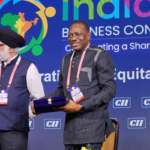
Dr Abdul-Rashid Hassan Pelpuo, Minister of Labour, Jobs and Employment, says investments in critical sectors and strategic partnerships could overcome Africa’s challenges and build resilient human capital for the transformation of the continent.
“Africa’s young population is one of her greatest assets for innovation, growth, and transformation.
“To turn this potential into real progress, we must equip young people with relevant education, skills, and opportunities,” he said.
The Minister made the call at a conference on Advancing the Next Generation for Equitable Development of Human Capital in India.
“From Ghana’s perspective, human capital development is at the core of our development agenda. We see it as the pathway to harnessing our demographic dividend and building inclusive prosperity,” he stressed.
Africa is at a crossroads in its demographic makeup, with the labour market being a defining feature of the ongoing transformation.
Research shows that 40 per cent of the population in Africa represents the youth (aged 15-35 years).
The growing youth population in Africa presents a plethora of opportunities and a myriad of challenges for policymakers to deal with.
This is because, on average, 11 million young people join the labour market in Africa each year, while an estimated 3.7 million jobs are created annually across the continent.
This creates a huge deficit between the demand and supply of labour which threatens the aspirations of African youth.
The Minister said, in Ghana, the focus areas of the country’s human capital development included scaling up education and skills training.
He stated that Ghana was expanding the Technical and Vocational Education and Training to prepare the youth for industry needs.
“We have developed the 1 million coders programme to ensure young people can fully participate in the global digital economy because digital literacy and ICT skills are now foundational skills.
“Beyond technical skills, soft skills, leadership development and critical thinking are being incorporated into our education reforms to nurture confident, innovative youth,” he said.
Another area, the Minister said was entrepreneurship, which was key to job creation.
“In Ghana, programmes such as the National Apprenticeship Programme, National Entrepreneurship and Innovation Programme and the Youth Employment Programme are supporting start-ups with funding, mentorship, and capacity building.”
These initiatives, Dr Pelpuo stated would empower young entrepreneurs and create sustainable jobs with a ripple effect not only for them but also for their peers and communities.
He said Ghana had leveraged collaboration with partners to provide invaluable opportunities for shared learning and growth.
“For example, Ghana has already benefited from India’s ICT Centres of Excellence, particularly in agriculture, IT, and vocational training.
“We see great potential to expand this partnership, especially in digital skills, renewable energy, and innovation-driven enterprises, to accelerate the development of Africa’s human capital,” he said.
Dr Pelpuo said the brain drain within the health sector of Africa was taking a toll on the healthcare systems.
He said coupled with this were the rising skills mismatches in the world of work, wherein in 2019, it was estimated that 54 per cent of employers could not find the right set of skills for employment, while an estimated 187 million people worldwide were without work.
The ILO also estimates that 69 per cent of employers across the globe were unable to find the right skills for the available jobs.
Similarly, 22 per cent of workers around the world were identified to be underutilising their skills at their current jobs.
Dr Pelpuo challenged the conference participants to take a critical look at these developing situations to inform the policy options of Africa.
That, he explained, was critical if African youth must be competitive globally.